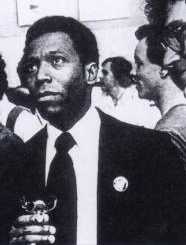Mel Boozer
| Mel Boozer | |
|---|---|
 Melvin "Mel" Boozer | |
| Born |
1946 Washington, D.C. |
| Died |
1987 Washington, D.C. |
| Nationality | American |
| Occupation | Professor of sociology, LGBT rights activist, President of the Gay Activists Alliance |
| Known for | The first openly gay candidate for Vice President of the United States |
Melvin "Mel" Boozer (1946-1987) was a university professor and activist for African-American, LGBT and AIDS issues. He was active in both the Democratic Party and Socialist Party USA.
Biography
Boozer grew up in Washington, D.C. where he graduated as salutatorian of his class at Dunbar High School. Boozer attended Dartmouth College on a scholarship. He entered the university in 1963, one of only three African Americans admitted that year.[1] Following his graduation he became a professor of sociology at the University of Maryland.[2] In 1979, Boozer was elected president of the Gay Activists Alliance,[3] in which office he served for two one-year terms.[4] He was the first African American to serve as GAA president and became "a leading moderate voice among black gays nationally".[5]
Boozer was nominated in 1980 for the office of Vice President of the United States by the Socialist Party USA[6] and, by petition at the convention, by the Democratic Party.[7] He was the first openly gay person ever nominated for the office.[6] Boozer spoke to the Democratic convention in a speech televised in prime time, calling on the party to support equality for LGBT people.
"Would you ask me how I dare to compare the civil rights struggle with the struggle for lesbian and gay rights? I can compare them and I do compare them, because I know what it means to be called a 'nigger' and I know what it means to be called a 'faggot,' and I understand the differences in the marrow of my bones. And I can sum up that difference in one word: none."[8]
Boozer received 49 votes before the balloting was suspended and then-Vice President Walter Mondale was renominated by acclamation.[9]
In 1981, Boozer was hired by the National Gay Task Force as district director[5] and a lobbyist. NGTF executive director Virginia Apuzzo fired him in 1983,[10] replacing him with then-GAA president Jeff Levi.[11] This had the effect of "leav[ing] the nation's oldest gay organization even whiter"[12] and drew protests from other gay African Americans.[10]
Boozer died of an AIDS-related illness in March 1987 at the age of 41 in Washington, D.C.[5][13]
Notes
- ↑ Sears, p. 298.
- ↑ Clendenin, et al., p. 419.
- ↑ GLAA.org 20 Years Later, GLAA Remembers Mel Boozer. Retrieved March 12, 2010.
- ↑ "1971–2007: Thirty-five years of fighting for equal rights". Gay and Lesbian Activists Alliance. Retrieved 2009-01-02.
- ↑ 5.0 5.1 5.2 Witt, et al., p. 18.
- ↑ 6.0 6.1 Smith, et al., p. 193
- ↑ Shilts, p. 32
- ↑ Rutledge, p. 156
- ↑ Sears, p. 389.
- ↑ 10.0 10.1 Smith, p. 42.
- ↑ Clendinen, et al., p. 477.
- ↑ Clendinen, et al., p. 495.
- ↑ "..:: IN Los Angeles Magazine ::.. ..:: AIDS at 25 ::..". In Magazine. Retrieved 2009-04-30.
References
- Cleninden, Dudley and Adam Nagourney (1999). Out For Good: The Struggle to Build a Gay Rights Movement in America. New York, Simon & Schuster. ISBN 0-684-81091-3.
- Rutledge, Leigh (1992). The Gay Decades. New York: Penguin. ISBN 0-452-26810-9.
- Sears, Thomas James (2001). Rebels, Rubyfruit, and Rhinestones: Queering Space in the Stonewall South. Rutgers University Press. ISBN 0-8135-2964-6.
- Shilts, Randy (1987). And the Band Played On: Politics, People, and the AIDS Epidemic. St. Martin's Press. ISBN 0-312-00994-1.
- Smith, Michael J. (1983). Colorful People and Places: A Resource Guide for Third World Lesbians and Gay Men, and for White People who Share Their Interests. Quarterly Press of BWMT.
- Smith, Raymond A. and Donald P. Haider-Markel (2003). Gay and Lesbian Americans and Political Participation: A Reference Handbook. ABC-CLIO. ISBN 1-57607-256-8.
- Witt, Lynn, Sherry Thomas and Eric Marcus (1995). Out in All Directions: The Almanac of Gay and Lesbian America. New York, Warner Books. ISBN 0-446-67237-8.